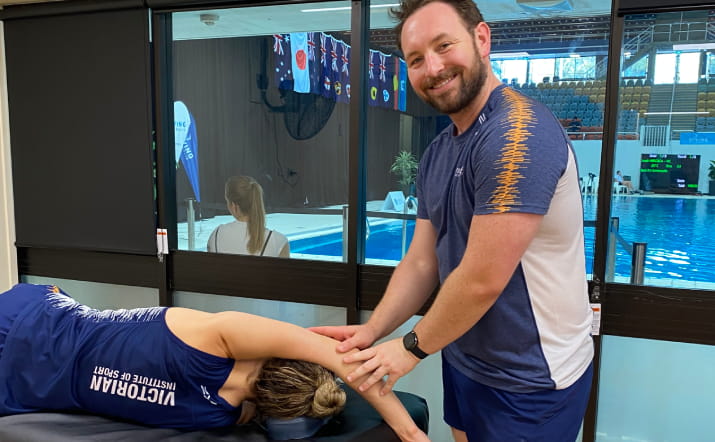4 careers in sport that aren’t athlete
Fascinated by a career in high performance sport? There are a number of opportunities you can explore that don’t require you to compete—but are just as rewarding.

Whether you are a self-confessed sports addict or already compete professionally, forging a career in the sports industry is probably the dream. While becoming a professional athlete might seem like the obvious choice, it’s not for everyone.
Here’s what you need to know about the jobs in sport that aren’t ‘athlete’—and how to secure a rewarding career in the sector.
1. Sports nutritionist or dietitian
Sports nutrition is about guiding an athlete (or team) on how best to fuel their body for success.
Proper nutrition is key to optimising athletic performance, which was one of the reasons Accredited Dietitian Jessica Rothwell pursued a career in sports nutrition.
“I always had an interest in the role of nutrition to support health and performance,” Jessica says. An interest that stemmed from both her upbringing on a farm where animal nutrition was prioritised and her previous career in race walking that saw her compete at the World Championships.
- Related reading: Dietitian vs nutritionist in Australia: What’s the difference?
As a sports dietitian Jessica works closely with athletes at the Victorian Institute of Sports, a government body that supports up and coming athletes, Olympians, Paralympians and World Champions with their training, careers and personal development.
She says the best part of being a sports dietitian is putting into practice her knowledge of nutrition and the role it plays in a body’s functioning. “[I love] working with a range of personalities and within a team where you share one common goal: helping people achieve their performance aspirations,” Jessica says.
Jessica is one of many staff members at the Victorian Institute of Sport who started out as an athlete, studying in her spare time so she could pursue a rewarding career behind the scenes in high performance sports.
How to become a sports dietitian:
A career in sports nutrition starts with a bachelor degree in nutrition or dietetics recognised by the Dietitians Association of Australia (DAA). Exposure to sports teams or institutes such as the Victorian Institute of Sport can also provide invaluable hands-on experience.
2. Sports physiotherapist
If you’ve ever played sport, you know injuries are common. Physiotherapists are an essential part of the recovery journey, but they also play an important part in injury prevention, providing advice and support on body mechanics, as well as helping to streamline movement.
Physiotherapist with the Victorian Institute of Sport Andrew Cameron says he enjoys working with athletes to fine tune the small things that can lead to big change. Because “just 1 percent can make a massive difference,” he says.
Prior to becoming a physiotherapist, Andrew was an elite swimmer with a talent for one of the sport’s most difficult strokes: butterfly. “I swam competitively until I was 23,” he says, explaining he studied in his spare time while competing so he could secure a career in a field he’d been fascinated by since he was 12 years old.
Andrew believes athletes tend to shy away from studying while competing, but he says it is possible to find success on both sides with the right balance, such as flexible online study.
How to become a sports physiotherapist:
To become a sports physiotherapist you’ll need to complete an undergraduate degree in physiotherapy. Students can also enhance their career prospects with postgraduate study in the sports and exercise physiotherapy field.

3. Sports psychologist
High performance sport can be mentally demanding. Sports psychologists are trained to help athletes manage the mental challenges that come with a life that’s immersed in elite sport.
As a sports psychologist the goal is to help athletes preserve good psychological wellbeing, maintain focus, build resilience, and find balance. All this to foster their potential while encouraging them to build on their training methods in a sound, reliable way.
- Related reading: Counsellor vs psychologist: Which career is right for you?
If you find the inner workings of the mind fascinating—particularly pertaining to how psychological strategies can influence performance and motivation—sports psychology provides a career centred around sport and how the mind can help or hinder success.
How to become a sports psychologist:
The first step in becoming a sports psychologist is to complete a Bachelor of Psychology. From there you can focus on sport as a specialisation with postgraduate studies, and provisional practice.
4. Coach
When it comes to jobs in sport, coaching is a central cog in the wheel of success. A coach’s role is to guide athletes along the path to achieving their goals, nurturing their talent while maximising their potential.
When you’re a coach a variety of skills are at play; from analysing performance to developing strategies that will improve results. You need a trained eye adept in spotting weaknesses, but you also need to utilise a toolkit of strategies to help an athlete improve their mindset.
If you possess excellent communication and leadership skills and understand a specific sport intimately, coaching could be your perfect fit. Each day you’ll be immersed in the sport you love, working closely with athletes to enhance their skills while providing guidance that can help shape and motivate them.
How to become a coach:
With a certification or degree in sports coaching, you’ll gain a comprehensive understanding of coaching techniques, game strategy, leadership skills, and athlete performance analysis. You could also strengthen your career with postgraduate study in sports coaching and leadership, which will prepare you to work with athletes in high performance sports.
It doesn’t end there—with other sports careers you can explore including sports science, sports management and medicine. Discover what’s possible with the online sports courses available through Open Universities Australia.



